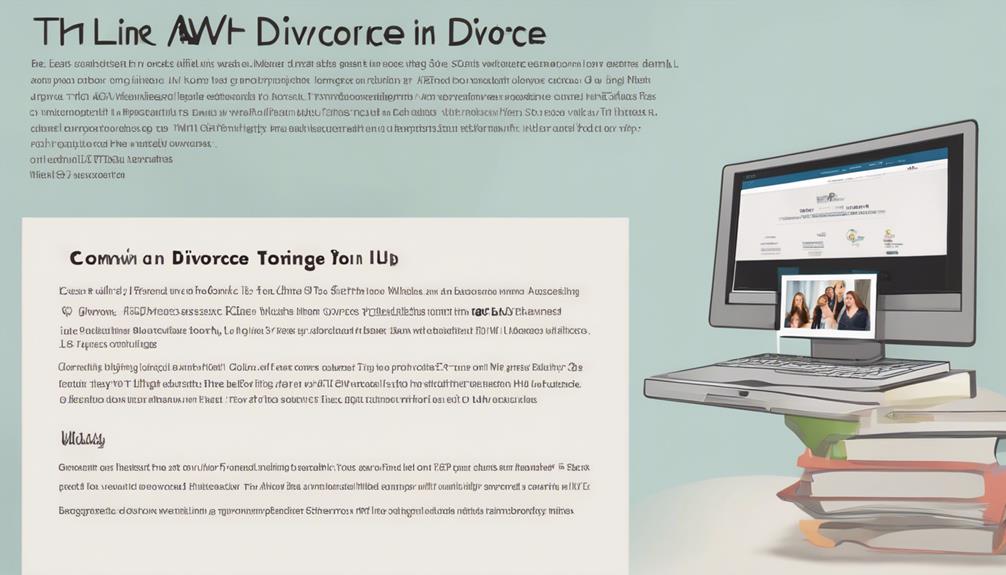When starting the divorce process in Texas with mutual consent, it’s similar to navigating a clear river with synchronized paddles – appears simple but has unseen challenges. Knowing the complexities of the procedure can assist both sides in smoothly navigating the legal waters towards a resolution.
From initiating the divorce to finalizing the decree, each step plays a vital role in shaping the outcome. Let's explore the detailed roadmap of how this voyage unfolds, ensuring a well-informed and efficient passage for those embarking on this shared expedition.
Key Takeaways
- Cooperation and communication can expedite a Texas divorce process.
- Timely completion of paperwork and adherence to court procedures are crucial.
- Finalizing an uncontested divorce typically takes around 60 days in Texas.
- Understanding the process timeline from filing to final hearing is essential.
Texas Divorce Process Timeline
Navigating the Texas Divorce Process Timeline requires careful attention to key steps and deadlines to ensure a smooth and efficient uncontested divorce process. In Texas, finalizing an uncontested divorce where both parties agree can be expedited, with the process typically taking around 60 days. Cooperation and communication between the parties play a vital role in expediting the proceedings. Agreeing on key issues such as property division, child custody, and support can significantly impact the speed at which the divorce is finalized.
Ensuring timely completion of required paperwork and adherence to court procedures is essential for a streamlined process. Understanding the process timeline, from filing the initial petition to attending the final hearing, is crucial for a successful uncontested divorce in Texas. By following the prescribed steps and maintaining open communication, couples can navigate the Texas divorce process timeline efficiently and effectively, leading to a quicker resolution of their divorce.
Filing the Initial Paperwork

When initiating a divorce in Texas, the first step involves submitting the Original Petition for Divorce to the court. This document outlines the grounds for divorce, requested relief, and other essential details of the case. Along with the Original Petition, court fees must be paid to initiate the divorce filing. Jurisdiction for the divorce case is determined based on the residency requirements of the parties in Texas. The court clerk plays a crucial role in this process by assigning a case number to the divorce filing, marking the official start of the divorce proceedings.
- Original Petition for Divorce: Details grounds for divorce and requested relief.
- Court Fees: Must be paid when filing the initial paperwork.
- Jurisdiction: Determined based on residency requirements in Texas.
Submitting the Original Petition for Divorce and paying the necessary fees are essential steps in starting the divorce process and setting the stage for further proceedings.
Court Hearing and Proceedings
After filing the initial paperwork for a divorce in Texas, the next significant step is the court hearing and proceedings, where the final divorce agreement is reviewed by a judge to ensure fairness and compliance with legal requirements. In uncontested divorces, this court process is typically quicker and more straightforward than in contested cases. Both parties must attend the court hearing to finalize the divorce process. During the court hearing, the judge may ask questions to confirm that both parties agree to the terms of the divorce settlement. This step is essential in ensuring that the agreement meets all legal requirements and that both parties are in alignment with the terms. Below is a table outlining key aspects of the court hearing and proceedings in uncontested divorces:
| Aspect | Details |
|---|---|
| Purpose | Review final divorce agreement |
| Attendees | Both parties |
| Judge's Role | Ensure fairness and compliance |
| Importance | Finalize divorce process |
Finalizing the Divorce Decree

Upon reaching the final stage of the divorce process in Texas, the crucial step of finalizing the divorce decree involves submitting the agreed terms to the court for approval. This marks the culmination of the divorce proceedings and sets the stage for the legal dissolution of the marriage. The divorce decree, once signed by the judge, solidifies the terms agreed upon by both parties, ensuring that each party understands their rights and responsibilities moving forward.
The divorce decree outlines the specifics of child custody arrangements, including visitation schedules and decision-making authority. It also addresses the issue of child support, detailing the amount to be paid and the frequency of payments. Property division is another key component included in the divorce decree, specifying how assets and debts will be divided between the parties.
Once the divorce decree is signed, the marriage is officially legally dissolved, and both parties are bound by the terms of the agreement, providing a clear roadmap for the post-divorce relationship.
Role of Family Law Attorney
Family law attorneys in Texas are essential for providing legal guidance and representation in divorce cases. They help clients understand their rights, obligations, and the legal process involved. These professionals excel in negotiating settlements, drafting legal documents, and representing clients in court. By ensuring all legal requirements are met, attorneys protect clients' interests throughout divorce proceedings. Their expertise expedites the process and aims for favorable outcomes. Engaging a knowledgeable attorney is crucial for navigating the complexities of divorce cases, as they have the experience and skills to advocate effectively. Trusting in an attorney's expertise can significantly impact the smooth resolution of divorce matters in Texas.
Frequently Asked Questions
Can You Request for a Divorce to Be Expedited in Texas if Both Parties Agree on All Terms?
Yes, if both parties agree on all terms, we can request to expedite a divorce in Texas. This can help streamline the process, potentially reducing the time it takes to finalize the divorce agreement.
Are There Any Specific Requirements or Waiting Periods for Getting a Divorce in Texas if Both Parties Agree?
In Texas, certain requirements exist for a divorce, even when both parties agree. Understanding these prerequisites is crucial to ensure a smooth process. Waiting periods can vary, but legal guidance can help navigate efficiently.
How Does the Divorce Process Differ in Texas if There Are Minor Children Involved and Both Parties Agree on Custody Arrangements?
Navigating divorce with minor children in Texas, when both agree on custody, is akin to a delicate dance, requiring legal precision and parental harmony. This process involves crafting a detailed parenting plan that prioritizes the children's well-being.
Are There Any Additional Fees or Costs Associated With Getting a Divorce in Texas if Both Parties Agree on All Terms?
When both parties agree on all terms in a Texas divorce, additional fees or costs are usually minimal. Legal fees, court filing fees, and any fees for required parenting classes or mediation may apply.
What Happens if One Party Changes Their Mind During the Divorce Process in Texas, Even if Both Initially Agreed to the Terms?
If one party changes their mind during a divorce in Texas, even if both initially agreed, it can complicate the process. We advise seeking legal counsel immediately to navigate the new circumstances effectively and ensure your rights are protected.
– What are the similarities and differences in the divorce process in Texas and California if both parties agree?
When both parties agree, the divorce process in California and Texas share similarities such as the need for a written agreement and filing a petition. However, differences arise in the waiting period, where Texas requires a 60-day waiting period before the divorce can be finalized, while California has a 6-month waiting period.
Conclusion
In the end, navigating the divorce process in Texas when both parties agree can be like sailing smoothly on calm waters.
By staying informed, cooperating with each other, and seeking guidance from a family law attorney, you can reach the shore of finalizing your divorce decree in a timely manner.
Remember, patience and communication are key as you embark on this journey towards a new chapter in your lives.










